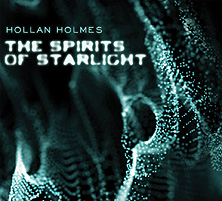 The
spirit of electronic instrumental music is alive and well on the fourth
solo album from Texas based synthesist Hollan Holmes. A surfacing
artist for film and animation by day and an electronica wizard by
night, Hollan has been honored with several accolades including a
nomination for 2013 electronic album of the year at One World Music
for his album Phase Shift. In 2014, Hollan is
back with yet another New Age synthesized masterpiece called The
Spirits Of Starlight. Hollan cites a number of synth
favorites like Steve Roach, Erik Wollø and Tangerine Dream
among his influences yet his own music maintains its own unique flair.
Hollan is being heralded as a modern day master of ambient soundscaping.
Summing up his own musical philosophy, Hollan explains, ‘Music
is an escape for me. It is my sanctuary and it is essentially how
I pray, how I purge my demons and how I lament. It is a deeply personal
experience for me, but one that brings me joy to share with anyone
who wishes to listen.’ Some might think an artist with such
musicial influences might be based in Berlin or even Paris, yet coming
from Texas, Hollan Holmes revolutionizes the spirit and scope of 21st
century ambient electronica with The Spirits Of Starlight. www.HollanHolmesMusic.com
The
spirit of electronic instrumental music is alive and well on the fourth
solo album from Texas based synthesist Hollan Holmes. A surfacing
artist for film and animation by day and an electronica wizard by
night, Hollan has been honored with several accolades including a
nomination for 2013 electronic album of the year at One World Music
for his album Phase Shift. In 2014, Hollan is
back with yet another New Age synthesized masterpiece called The
Spirits Of Starlight. Hollan cites a number of synth
favorites like Steve Roach, Erik Wollø and Tangerine Dream
among his influences yet his own music maintains its own unique flair.
Hollan is being heralded as a modern day master of ambient soundscaping.
Summing up his own musical philosophy, Hollan explains, ‘Music
is an escape for me. It is my sanctuary and it is essentially how
I pray, how I purge my demons and how I lament. It is a deeply personal
experience for me, but one that brings me joy to share with anyone
who wishes to listen.’ Some might think an artist with such
musicial influences might be based in Berlin or even Paris, yet coming
from Texas, Hollan Holmes revolutionizes the spirit and scope of 21st
century ambient electronica with The Spirits Of Starlight. www.HollanHolmesMusic.com
mwe3.com presents an interview with
Hollan Holmes
 mwe3:
Where are you from originally and where do you live now and what do
you like best about it? Do you travel much and what are some of your
favorite destinations here in the US and abroad?
mwe3:
Where are you from originally and where do you live now and what do
you like best about it? Do you travel much and what are some of your
favorite destinations here in the US and abroad?
HOLLAN HOLMES: I was born and raised in Dallas, Texas USA.
I still live in North Texas and have always called Texas my home.
While I like where I live, I hope to someday live near the mountains
and rivers somewhere here in the US and where the summers aren't so
brutal as they are in Texas. I don't travel outside the country much
anymore, but I love visiting the mountains and deserts of the United
States. I'd love to visit Scotland someday, as well as Russia and
Germany. Patagonia is on the list, too.
mwe3: When and how did you become so immersed in the world
of electronic music. I read that you were very interested in Tangerine
Dream and Jean Michel Jarre and you met Steve Roach and then worked
with him. It must be an incredible story. Did you grow up listening
to rock and then turn to electronica? I imagine progressive rock must
have sparked some of your interest in electronica.
HOLLAN HOLMES: My interests in music have been diverse. I grew
up listening to country & western and all the typical pop bands
of the 1960’s and ‘70s. In high school I discovered progressive
rock like that of Rush and Pink Floyd, both of whom I'm still a huge
fan. In '81 I joined my first rock band and, having grown up with
a Baldwin upright piano in my house, I naturally gravitated toward
playing keys and synths. In '82, I discovered Jean Michele Jarre and
fell immediately in love with his work. That same year, my grandmother
loaned me $400 and I bought my first synth, a Moog Prodigy, which
I still have! Around '85 I discovered Tangerine Dream on a rock climbing
trip in West Texas and fell in love with this very unique sound. None
of my friends were interested in this sort of music, so I started
experimenting with my own compositions by myself, using a little four-track
cassette recorder and a Korg DSS-1 sampler.
If I wasn't working, I was either rock climbing/mountaineering or
I was twiddling synth knobs. Around '89 or so, I discovered Steve
Roach and was blown away. That was the music I'd been wanting to make
for years. Around 1990, while working as a baggage handler for American
Airlines, I was loading a flight to Tucson, when I noticed crates
of music gear belonging to none other than Steve Roach. Like a giddy
fanboy, I ran upstairs, bribed the gate agent to let me onboard and
got Steve's autograph. Fast forward 14 years... I've been a traditional
artist all my life and in 2003, after teaching myself 3-D and digital
art on a laptop in between flights, I quit American Airlines and took
a job with Reel FX Creative Studios.
 In 2004,
on a whim, I approached Steve Roach about the possibility of doing
some CD art for him. He liked the idea and agreed to give me a chance,
then he found out that I was that giddy fanboy who ran up and begged
for his autograph some fourteen years earlier. Surprisingly, he'd
not forgotten about that day. We had a good laugh over that. Since
then, I've done the art for Lost Pieces Vol. 4, immersion
one, his Circuit Mandala tee shirt design and all the graphics
for all versions of his Immersion Station iPhone app. I ended up hiring
him to master my first CD in 2010, which was a massive honor for me,
as I deeply respect Steve's work.
In 2004,
on a whim, I approached Steve Roach about the possibility of doing
some CD art for him. He liked the idea and agreed to give me a chance,
then he found out that I was that giddy fanboy who ran up and begged
for his autograph some fourteen years earlier. Surprisingly, he'd
not forgotten about that day. We had a good laugh over that. Since
then, I've done the art for Lost Pieces Vol. 4, immersion
one, his Circuit Mandala tee shirt design and all the graphics
for all versions of his Immersion Station iPhone app. I ended up hiring
him to master my first CD in 2010, which was a massive honor for me,
as I deeply respect Steve's work.
mwe3: I was reading about your 2013 album Phase Shift and
found it interesting to read your words that even though man has achieved
such remarkable technical systems over the past century, that we still
fight such horrible wars and have such problems on Earth. It is such
a conundrum that we’re living through these past few decades.
How do you express those feelings in your music?
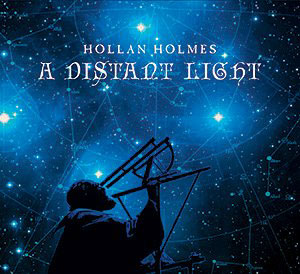 HOLLAN
HOLMES; Composing music that expresses an emotion or a state of
mind is a huge challenge for me, but I never tire of trying. For me,
making music is how I pray, how I lament, how I meditate, how I celebrate.
Sometimes the music comes quickly and easily in multiple waves. Other
times I may struggle for weeks to produce anything of any real interest
or emotional value. While I don't want all of my music to reflect
the darkness and evil that seems to be growing in the world, I feel
compelled to explore these feelings and these experiences musically
on occasion and try to give something positive back to the listener.
HOLLAN
HOLMES; Composing music that expresses an emotion or a state of
mind is a huge challenge for me, but I never tire of trying. For me,
making music is how I pray, how I lament, how I meditate, how I celebrate.
Sometimes the music comes quickly and easily in multiple waves. Other
times I may struggle for weeks to produce anything of any real interest
or emotional value. While I don't want all of my music to reflect
the darkness and evil that seems to be growing in the world, I feel
compelled to explore these feelings and these experiences musically
on occasion and try to give something positive back to the listener.
Like I said, it's how I pray, meditate and purge the darkness. Music
and the creative process is extremely therapeutic for me, so I dare
not imagine a life where I wasn't able to create art and music. It's
who I am and why I was put on this Earth at this time. I still believe
to this day that music is an exceptionally powerful force on the human
psyche. I'd like to think that my music has a positive effect on people.
The concept of using music to elicit feelings of love, hope, excitement,
energy, whatever; that excites me. That's the music I want to make;
music that moves the listener emotionally.
mwe3: Following Phase Shift, you released another new
amazing CD in 2014 called The Spirits Of Starlight. How does
this new album fit into your repertoire and are there other themes
of ideas running through the new CD and how would you compare The
Spirit Of Starlight with your other albums both musically and
conceptually?
HOLLAN HOLMES; First, thank you for the kind words, I'm honored.
I feel like each album I've made was a subtle transition into something
a little different than the one before, because I'm constantly exploring
new sounds, new techniques, new software and hardware and new emotional
ground that wasn't covered previously. This naturally leads to subtle,
and sometimes dramatic, shifts in the overall character of my work.
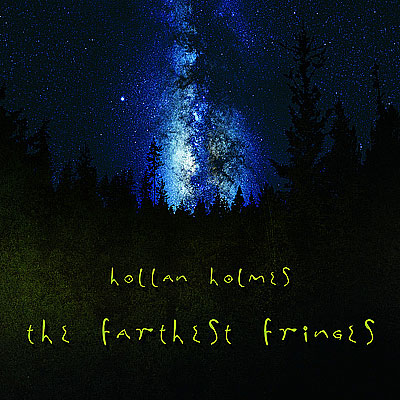 Over time,
much of my music has become much more traditionally structured and
less of the unbroken drones. Ultimately, I like to explore somewhere
in between those two states. The repetitive drone, if done artfully,
can be a relaxing, trance-inducing ride through an ecstatic dream
state. The structural approach, such as using various forms of phrasing
and chordal movements, also if carefully crafted, can evoke various
emotions, memories, feelings or thoughts. I like trying to blend the
two into a short story or temporary experience.
Over time,
much of my music has become much more traditionally structured and
less of the unbroken drones. Ultimately, I like to explore somewhere
in between those two states. The repetitive drone, if done artfully,
can be a relaxing, trance-inducing ride through an ecstatic dream
state. The structural approach, such as using various forms of phrasing
and chordal movements, also if carefully crafted, can evoke various
emotions, memories, feelings or thoughts. I like trying to blend the
two into a short story or temporary experience.
The name, The Spirits Of Starlight, was chosen because when
I was a boy, I would look up in the sky at night and imagine that
each star was a spirit that is watching over us. Of course, I later
learned that they were actually stars like our own Sun, but I never
quit imagining them as these distant guardians, waiting for us to
get our act together and learn to play nice. I want my music to be
positive and hopeful. The feedback from listeners suggests that this
childlike wonder and amazement for the heavens is shared by many and
that my music has, at least on occasion, touched people in a positive
way.
Musically and conceptually, it isn't that distant from my other efforts,
but I hope that I've done something unique enough to engage not only
new listeners, but past and present listeners, as well. If anyone
ever says my music all sounds the same, I'll know I need to shift
gears in a big way. I never want my listeners to be bored in any way.
I don't mind if my music induces sleep, especially if that was my
intent... in fact, I'm flattered if they vege out while listening
but I don't want my music to ever be considered boring or uninteresting.
mwe3: With each new album, how do you keep up with all the
technological advances in the world of electronic music and how would
you describe the way the EM genre has evolved through the decades.
How does your early gear stack up with your new musical equipment
and can you tell us about some of the gear used to create the new
Spirits Of Starlight CD?
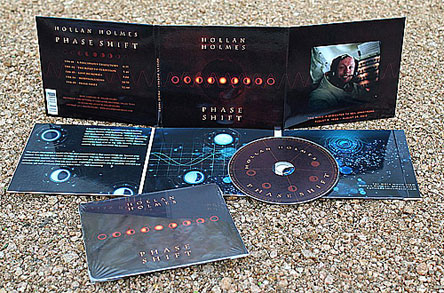 HOLLAN
HOLMES; I don't try to keep up with technology for its own sake,
but I do occasionally make upgrades, both with hardware and software.
I know my work is not cutting edge or innovative or anything of that
nature. In fact, I rather enjoy keeping it simple. With today's software,
there are some really creative things you can do, so I'm always learning
new little tricks and methods for making new sounds, so as time goes
by, my sound will grow and morph into a different sound or a different
direction and I'm comfortable with that. Of course, I don't want to
abandon my audience, but at the same time, I don't think they would
want me to stop exploring new ground either.
HOLLAN
HOLMES; I don't try to keep up with technology for its own sake,
but I do occasionally make upgrades, both with hardware and software.
I know my work is not cutting edge or innovative or anything of that
nature. In fact, I rather enjoy keeping it simple. With today's software,
there are some really creative things you can do, so I'm always learning
new little tricks and methods for making new sounds, so as time goes
by, my sound will grow and morph into a different sound or a different
direction and I'm comfortable with that. Of course, I don't want to
abandon my audience, but at the same time, I don't think they would
want me to stop exploring new ground either.
With regard to my gear, I remember starting out in the early 1980’s,
when a decent recording studio required thousands and thousands of
dollars worth of gear, if you wanted to sound professional. Also,
a lot of that gear were expensive analog machines whose oscillators
would drift at the slightest temperature change or bump against the
wall. Needless to say, I didn't have much in the way of gear. I never
dreamed that we would reach the day and age where a musician could
own one hundred virtual rack spaces of synths, signal processors,
equalizers, samplers, just about anything that exists in a real world
rack (that) has been successfully emulated by ones and zeroes in software
at very affordable prices, fractions of their real-world counterparts,
so I have a pretty extensive collection of tools and software for
making electronic music.
I do still have a lot of my old analog synths, though, because I can't
stop loving them. Steve Roach has mentioned on more than one occasion
to me that he loves the tactile act of tweaking a knob to interactively
create a new sound. He lives for analog. He spends most waking moments
carving out new soundscapes using his intimate knowledge of his analog
gear. I like to do the same, I just use a mouse more than I do real
world knobs, but the passion for that creative process is the same.
Ultimately, it is a great time to be a musician, because what once
would have cost a musician tens of thousands of dollars in gear to
achieve a high quality recording, can now be done with just a few
hundred bucks, at least in the beginning. Of course, the musician
still must write music that people want to hear. There's no app for
that. If there were, I'd be screwed.
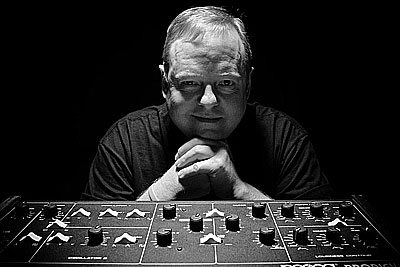 mwe3:
You have worked with Steve Roach on the mastering of your albums in
the past and on The Spirit Of Starlight you worked with Chad
Kettering. What is involved in mixing and mastering your music in
order to keep all the sounds synchronized for maximum audio perfection?
Who else is involved in the making of your album releases?
mwe3:
You have worked with Steve Roach on the mastering of your albums in
the past and on The Spirit Of Starlight you worked with Chad
Kettering. What is involved in mixing and mastering your music in
order to keep all the sounds synchronized for maximum audio perfection?
Who else is involved in the making of your album releases?
HOLLAN HOLMES; Since there is no way that I could physically
play the complex arpeggios and sequences that I write, I rely on software
sequencers for virtually all of my composing and arranging. All the
synchronization takes place in the software, based on the desired
BPM and time signature settings. I honestly haven't the technical
prowess to play much of anything on the keyboard these days, since
I let what chops I may have had wither on the vine, in favor of a
different approach. This is why, when people comment about me as a
musician, I'm quick to point out that I don't have enough skill to
be called a musician, so I'm more comfortable being referred to as
a composer and sound designer.
When I first started doing this in the ‘80s, I played everything
on a midi controller or synths directly into a four-track recorder.
I had no choice but to perform most of the songs and I loved it, but
with a sequencer, I'm able to arrange musical compositions that I
could never achieve by playing the notes on a keyboard.
When I started taking this music-making thing really seriously in
2005, I didn't really know what I was doing, so many of my mixes were
terrible, sometimes harsh, and often of questionable sonic quality.
Poor Steve Roach was tasked with taking my first CD's tracks all mixed
down to stereo with no individual channel tracks, and turning them
into something listenable. I really gave him pretty low quality data,
but he turned it into something very listenable and much higher quality
than the original files.
 As
time has gone on, I've learned a lot in terms of producing better
mixes, better sounds and higher quality audio fidelity, so that now,
when I hand off a CD's worth of music to Chad Kettering for mastering,
his job is a little easier each year, because I'm handing off much
better sounding material. Kettering then makes it shine in a way that
I cannot yet achieve. I think it's voodoo. He has a big jar of chicken
entrails and tea leaves somewhere in his studio, I just know it.
As
time has gone on, I've learned a lot in terms of producing better
mixes, better sounds and higher quality audio fidelity, so that now,
when I hand off a CD's worth of music to Chad Kettering for mastering,
his job is a little easier each year, because I'm handing off much
better sounding material. Kettering then makes it shine in a way that
I cannot yet achieve. I think it's voodoo. He has a big jar of chicken
entrails and tea leaves somewhere in his studio, I just know it.
With regard to who is involved in the making of my music, it's really
just me, although I do like to share works-in-progress with a few
trusted individuals whom I know will provide honest feedback. An objective
viewpoint is always appreciated, even if I decide not to implement
their suggestions when they have them. It's worth noting, too, that
while I'm proud of the work I've done, I never know how listeners
are going to react to a new release. I'm always a bit apprehensive,
but so far, I've done okay.
mwe3: Tell us about your work as an animator and how it compliments
your work as an electronic musician. What other plans do you have
for 2015 as it relates to music and other artistic endeavors? Are
you setting your sights on the next musical achievement?
HOLLAN HOLMES; I work as senior surfacing artist in Dallas
based animation studio, Reel FX. Think of surfacing as digitally painting
the surface of a 3-D model as one would paint a plaster sculpture
with a paint brush. For instance, in the animated feature, The
Book Of Life, my job was to take a character, prop or other digital
asset and create all of the various surface qualities, based on reference
art and the desired look of the film. Having been a traditional artist
all my life, it was an almost seamless transition into the digital
realm and, of course, the creative process is extremely similar, only
the tools have changed. I don't know if I could pinpoint how these
skills have benefited my music, but they have certainly helped in
creating the imagery for the CD covers and package designs. I created
almost all of the art for all of my CDs.
 My
time in the film industry has also translated well into the production
of my music videos for Youtube, which I love making, but rarely have
time, because the music production, my job and life in general keeps
me very busy. I try to make two or three videos per year, though.
Videos are a great promotional tool.
My
time in the film industry has also translated well into the production
of my music videos for Youtube, which I love making, but rarely have
time, because the music production, my job and life in general keeps
me very busy. I try to make two or three videos per year, though.
Videos are a great promotional tool.
2015 is going to be a very busy year for me musically. My fifth CD
is scheduled for a spring release, after which I go directly into
a continuing collaboration with the West Coast based ambient duo,
Resonant Drift, so possibly two releases in 2015. I've always got
something going, even if it's on the back burner, so I've been able
to release new material every year. I've been blessed beyond measure
that my music has been so well received and that there is a demand
for more. That's a very great honor for me and it does not ever go
unrecognized or unappreciated. Well received or not, I'd make music
anyway. It always restores my soul. I simply can't resist the creative
process. It's very rewarding.
Thanks to Hollan Holmes @ www.HollanHolmesMusic.com



